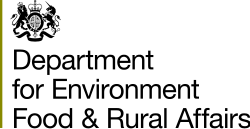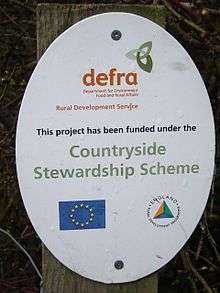Department for Environment, Food and Rural Affairs
The Department for Environment, Food and Rural Affairs (Defra) is the government department responsible for environmental protection, food production and standards, agriculture, fisheries and rural communities in the United Kingdom of Great Britain and Northern Ireland. Concordats set out agreed frameworks for co operation, between it and the Scottish Government,[2] Welsh Government[3] and Northern Ireland Executive,[4] which have devolved responsibilities for these matters in their respective nations.
| Welsh: Adran yr Amgylchedd, Bwyd a Materion Gwledig | |
 | |
| Department overview | |
|---|---|
| Formed | 2001 |
| Preceding agencies | |
| Jurisdiction | United Kingdom |
| Headquarters | 2 Marsham Street, London |
| Annual budget | £2.2 billion (current) & £400 million (capital) for 2011-12[1] |
| Minister responsible |
|
| Department executive |
|
| Child agencies | |
| Website | defra |
Defra also leads for Britain at the EU on agricultural, fisheries and environment matters and in other international negotiations on sustainable development and climate change, although a new Department of Energy and Climate Change was created on 3 October 2008 to take over the last responsibility; later transferred to the Department for Business, Energy and Industrial Strategy following Theresa May's appointment as Prime Minister in July 2016.
Creation
It was formed in June 2001, under the leadership of Margaret Beckett, when the Ministry of Agriculture, Fisheries and Food (MAFF) was merged with part of the Department of Environment, Transport and the Regions (DETR) and with a small part of the Home Office.
The department was created after the perceived failure of MAFF, to deal adequately with an outbreak of Foot and Mouth disease. The department had about 9,000 core personnel, as of January 2008.[5]
In October 2008, the climate team at Defra was merged with the energy team from the Department for Business Enterprise and Regulatory Reform (BERR), to create the Department of Energy and Climate Change, then headed by Ed Miliband.[6]
Ministers
The Defra Ministers are as follows:[7][8]
| Minister | Rank | Portfolio |
|---|---|---|
| The Rt Hon. George Eustice MP | Secretary of State for Environment, Food and Rural Affairs | Strategy and overall responsibility for departmental policy; Budget and finances; Legislative programme; Emergencies; EU and international relations; Environment Agency and Natural England. |
| The Rt Hon. The Lord Goldsmith of Richmond Park | Minister of State for the Pacific, Environment and Conservation[9] (jointly with FCO and DFID) | Climate change, Environment and Conservation, Biodiversity; Oceans; Oceania; Blue Belt. |
| The Hon. Rebecca Pow MP | Parliamentary Under Secretary of State for the Environment and Rural Opportunities | Domestic natural environment; 25 Year Environment Plan; Environment Bill; Climate change adaptation, co-ordination of DEFRA input to net zero, land use; Floods and water; Resource and environmental management (including waste, air quality, chemicals, litter); Commercial projects including Covent Garden Market and waste PFI projects; Lead for Environment Agency and Natural England; Commons Minister for rural affairs, landscape, and adaptation. |
| The Rt Hon. The Lord Gardiner of Kimble | Parliamentary Under Secretary of State for Rural Affairs & Biosecurity | All DEFRA parliamentary business in the House of Lords; Animal health and traceability; Bee health and National Pollinator Strategy; Biosecurity, including endemic and exotic plant and animal disease, invasive alien species and Kew Gardens; Landscape, including national parks, AONBs and access; Rural ambassador and rural affairs, covering rural life opportunities, broadband and mobile. |
| The Hon. Victoria Prentis MP | Parliamentary Under Secretary of State for Agriculture, Fisheries and Food | Food and farming, including CAP (Common Agricultural Policy); Brexit readiness; fisheries; bovine TB (tuberculosis) policy; trade; science and innovation; pesticides; better regulation; lead for Rural Payments Agency (RPA), the Agriculture and Horticulture Development Board (AHDB), Cefas, Marine Management Organisation (MMO); Commons Minister for biosecurity, plant health and animal disease. |
The Permanent Secretary is Tamara Finkelstein, who replaced Clare Moriarty in 2019.[10][11]
Shadow ministers portfolios can differ from government departments therefore overlap.
Responsibilities
Defra is responsible for British Government policy in the following areas[12]
- Adaptation to global warming
- Agriculture
- Air quality
- Animal health and animal welfare
- Biodiversity
- Conservation
- Chemical substances and pesticides
- Fisheries
- Flooding
- Food
- Forestry
- Hunting
- Inland waterways
- Land management
- Marine policy
- National parks
- Noise
- Plant health
- Rural development
- Sustainable development
- Waste management
- Water management
Some policies apply to England alone due to devolution, while others are not devolved and therefore apply to Britain as a whole.
Executive agencies
The department's executive agencies are:[13]
- Animal and Plant Health Agency (formerly the Animal Health and Veterinary Laboratories Agency, formed by a merger of Animal Health and the Veterinary Laboratories Agency,[14] and later parts of the Food and Environment Research Agency. Animal Health had launched on 2 April 2007 and was formerly the State Veterinary Service)[15]
- Centre for Environment, Fisheries and Aquaculture Science
- Rural Payments Agency
- Veterinary Medicines Directorate
Key delivery partners
The department's key delivery partners are:[16]
- Agriculture and Horticulture Development Board
- Consumer Council for Water
- Environment Agency
- Fera Science (formerly the Food and Environment Research Agency, now a company in which DEFRA holds a 25% stake)
- Forestry Commission (a non-ministerial government department including Forest Enterprise and Forest Research)
- Joint Nature Conservation Committee
- Marine Management Organisation (launched on 1 April 2010, incorporates the former Marine and Fisheries Agency)[17]
- National Forest Company
- Natural England (launched on 11 October 2006, formerly English Nature and elements of the Countryside Agency and the Rural Development Service)[18]
- Ofwat (a non-ministerial government department formally known as the Water Services Regulation Authority)
- Royal Botanic Gardens, Kew
- Sea Fish Industry Authority
A full list of departmental delivery and public bodies may be found on the Defra website.[19]
Defra in the English regions

Policies for environment, food and rural affairs are delivered in the regions by Defra's executive agencies and delivery bodies, in particular Natural England, the Rural Payments Agency, Animal Health and the Marine Management Organisation.
Defra provides grant aid to the following flood and coastal erosion risk management operating authorities:
Aim and strategic priorities
Defra's overarching aim is sustainable development, which is defined as "development which enables all people throughout the world to satisfy their basic needs and enjoy a better quality of life without compromising the quality of life of future generations." The Secretary of State wrote in a letter to the Prime Minister that he saw Defra’s mission as enabling a move toward what the World Wide Fund for Nature (WWF) has called "one planet living".[20]
Under this overarching aim, Defra has five strategic priorities:[21]
- Climate change and energy.
- Sustainable consumption and production, including responsibility for the National Waste Strategy.
- Protecting the countryside and natural resource protection.
- Sustainable rural communities.
- A sustainable farming and food sector including animal health and welfare.
In response to growing concerns about the United Kingdom's exit from the European Union and the effect it would have specifically on access to food for the British Public, Defra have put "a smooth and orderly exit from the European Union" as a priority.[22]
See also
- Badger culling in the United Kingdom
- Cattle Health Initiative
- Department of Agriculture and Rural Development (Northern Ireland)
- Energy policy in the United Kingdom
- Energy use and conservation in the United Kingdom
- Environmental contract
- List of atmospheric dispersion models
- National Bee Unit
- National Collection of Plant Pathogenic Bacteria
- New Technologies Demonstrator Programme
- Nicola Spence
- Scottish Executive Environment and Rural Affairs Department
- UK Dispersion Modelling Bureau
- United Kingdom budget
- Waste Implementation Programme
References
- Budget 2011 (PDF). London: HM Treasury. 2011. p. 48. Archived from the original (PDF) on 1 August 2011. Retrieved 30 December 2011.
- "Concordat between MAFF and the Scottish Executive". Archived from the original on 8 February 2011.
- "Concordat between MAFF and the Cabinet of the National Assembly for Wales". Archived from the original on 23 February 2006.
- "Devolution: Subject specific Concordat between MAFF and the Scottish Executive on fisheries". Archived from the original on 20 November 2008.
- "Defra departmental report" (PDF). Archived from the original (PDF) on 27 June 2008.
- Harrabin, Roger (3 October 2008). "Marrying energy demand and supply". BBC News. Retrieved 22 May 2009.
- "Our ministers". GOV.UK. Department for Environment, Food and Rural Affairs. Retrieved 1 August 2019.
- "Her Majesty's Official Opposition". UK Parliament. Retrieved 17 October 2017.
- "Zac Goldsmith (@ZacGoldsmith)". Twitter. Retrieved 3 March 2020.
- , Defra
- "Appointment of new Permanent Secretary at Defra". GOV.UK. 19 June 2019. Retrieved 21 June 2019.
- "Cabinet Office List of Ministerial Responsibilities, July 2010". Cabinetoffice.gov.uk. 16 September 2010. Retrieved 18 November 2011.
- "List of ministerial responsibilities (including Executive Agencies and Non-Ministerial Departments)" (PDF). Retrieved 18 November 2011.
- "DEFRA Agencies shake-up", news release by DEFRA, 29 June 2010 (from the DEFRA website)
- "Launch of Animal Health" Archived 22 April 2007 at the Wayback Machine, news release by Animal Health, 2 April 2007 (from the Defra website)
- "Working with others: Defra's delivery partners" Archived 5 February 2007 at the Wayback Machine, Chapter 6, Departmental Report 2006 (from the Defra website)
- "Marine Management Organisation established" Archived 2 April 2010 at the Wayback Machine, press release by Defra, 1 April 2010 (from the Defra website.
- "New champion for the environment launches" Archived 10 June 2007 at the Wayback Machine, press release by Natural England, 11 October 2006 (from the Natural England website)
- "Delivery Landscape Map". Archived from the original on 29 April 2007.
- "My priorities for Defra" Archived 10 June 2007 at the Wayback Machine, David Miliband's letter to the Prime Minister, 11 July 2006
- "Delivering the Essentials of Life: Defra’s Five Year Strategy" Archived 6 February 2007 at the Wayback Machine, Annex B
- https://www.gov.uk/government/organisations/department-for-environment-food-rural-affairs/about
External links
- Defra's official website
- Fera - Executive agency of DEFRA
- National Collection of Plant Pathogenic Bacteria - Fera
- English Nature's website
- JNCC's website
- Defra's wiki for formulating an environmental contract
- Air Quality Expert Group
.svg.png)